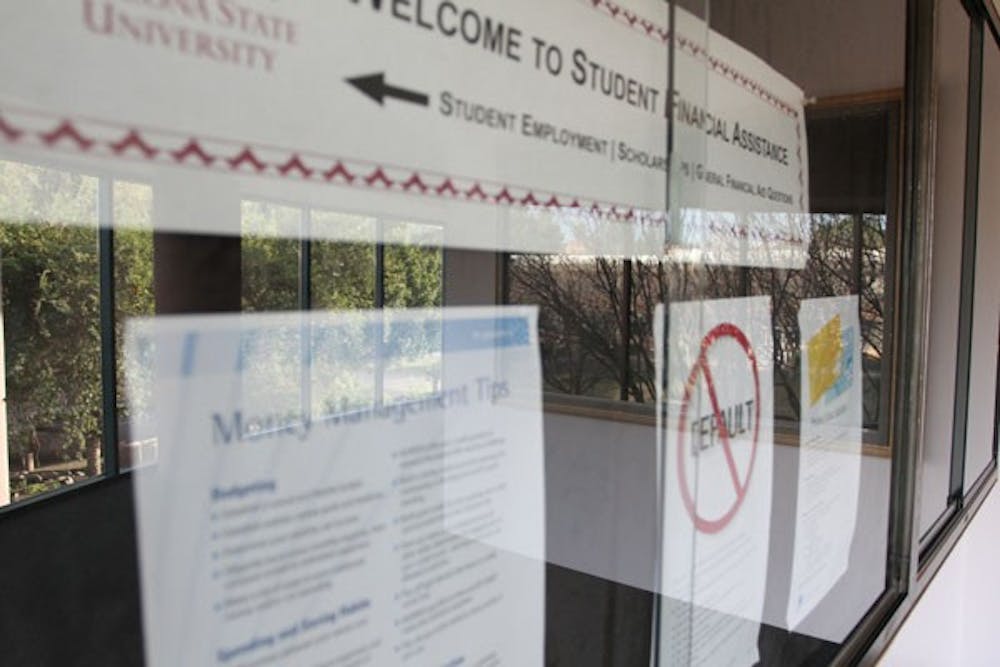Along with a 3 percent hike in tuition, many ASU students will see their post-college loan payments skyrocket if Congress doesn't act by July 1.
That's when the interest rate for subsidized federal Stafford student loans is set to double. This would leave Arizona students an average of $902 more in debt per loan, according to the Arizona Public Interest Research Group.
Serena Unrein, a public interest advocate with the group, said raising the interest rate will raise money for the federal government at the expense of students and graduates. "Congress should remember that the ultimate goal of investing in students is to invest in our future economy," she said. "It's shortsighted to generate profits off the backs of college students while pushing them deeper into debt." College graduates in Arizona leave school with an average of $19,950 in debt, according to PIRG, and student loan debt across the country reached $1 trillion last year.
This leaves some students, like economics sophomore Anisha Hindocha, struggling to avoid taking out any loans. Hindocha qualified for a Stafford loan last year and turned it down, along with other loans and her meal plan.
Instead, she relied on an academic merit scholarship and working to get by. She's now back to living with her family to cut as many costs as possible and be better able to go on to law school.
"I figured if I can save as much as I can in undergrad, I'll feel better about having to take out loans in law school," she said.
However, she recognizes that not all students can avoid taking out loans, which brought her to Washington, D.C., earlier this month to persuade lawmakers to stop the interest rate hike.
The 3.4 percent rate for Stafford loans was set to expire in 2012, but lawmakers were able to delay the jump to 6.8 percent for a year. With a few more weeks to go, no plans from either party have been successful so far this year.
"There isn't a solution right now," Hindocha said. "They just need to come together and extend the 3.4 percent interest rate until we can work toward a better plan."
Rep. Kyrsten Sinema, D-Phoenix, has begun an online campaign, Drop That Debt, to gather stories from students and recent graduates from around the country about how student loan debt impacts their lives to show to other members of Congress.
While student voices are important to the debate, Hindocha said, it's ultimately up to politicians.
"I hate having to say that because it makes me feel really powerless, but there's nothing we can do," she said. "It's all in the hands of our leaders."
Economics junior Katherine Richard, who also traveled to Washington, D.C., with Hindocha and the Center for American Progress, chose to attend ASU because she was able to combine public and private scholarships and in-state tuition to avoid paying loans.
"Without scholarships, I would be accruing debt each year," she said in an email, "not because I am irresponsible, but because I would have to find a way to fund my own education." She said doubling subsidized Stafford loan interest rates would hurt students and recent graduates who couldn't afford it the most because they're based on financial need.
"Doubling interest rates would be a financial disaster for the future middle and lower classes," she said. "These are the people who need loans by their very nature. People who are working hard to get an education will be paying back interest for decades, while people who work just as hard yet come from privileged backgrounds will not have to do so."
Among these students is NAU junior Shayna Stevens, who joined Unrein on a conference call with PIRG on Thursday. Stevens, who plans to work as a teacher, works part-time during the school year and full-time in the summer but is still thousands of dollars in debt.
"The federal government should not be generating short-term profit from students," she said.
Reach the managing editor at julia.shumway@asu.edu or follow @JMShumway on Twitter.
Like The State Press on Facebook and follow @statepress on Twitter.




